Unit-3--could-you-please-clean-your-room单元备课
(精校版)Unit3couldyoupleasecleanyourroom知识点及短语
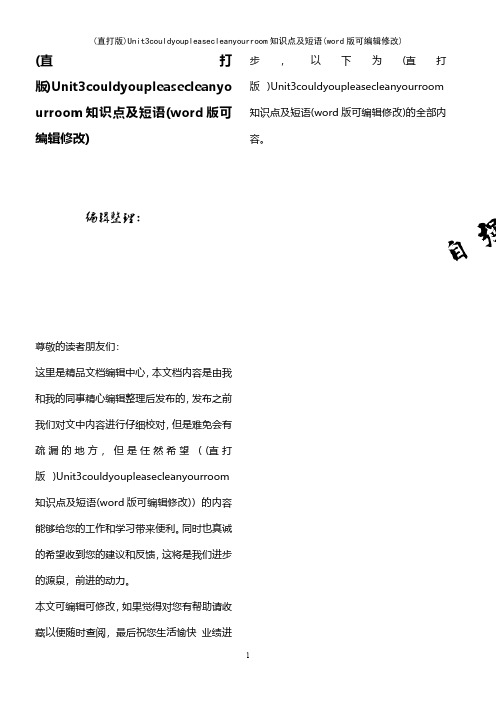
(直打版)Unit3couldyoupleasecleanyourroom 知识点及短语(word 版可编辑修改)编辑整理:尊敬的读者朋友们:这里是精品文档编辑中心,本文档内容是由我和我的同事精心编辑整理后发布的,发布之前我们对文中内容进行仔细校对,但是难免会有疏漏的地方,但是任然希望((直打版)Unit3couldyoupleasecleanyourroom知识点及短语(word 版可编辑修改))的内容能够给您的工作和学习带来便利。
同时也真诚的希望收到您的建议和反馈,这将是我们进步的源泉,前进的动力。
本文可编辑可修改,如果觉得对您有帮助请收藏以便随时查阅,最后祝您生活愉快 业绩进步,以下为(直打版)Unit3couldyoupleasecleanyourroom 知识点及短语(word 版可编辑修改)的全部内容。
Unit3 知识点1。
Could you please do sth ?请你(做).。
.。
.好吗?Could用于提出请求,不是can的过去式,是委婉、礼貌的说法。
回答用can.2. 【短语】take out the trash 倒垃圾 take a walk 散步 take away 拿走/取走take back 收回 take place 发生 take off 脱下; 起飞3. do the +名词:do the dishes/ laundry 洗餐具/衣服do the +doing: do the cleaning 打扫卫生do one’s + 名词: do one’s housework/ homework 做家务/家庭作业do some +doing: do some reading/ shopping 读写书/购物4。
表示时间、距离、金额、度量等词语作主语时,通常被视作整体,谓语动词用单数形式。
5。
enough 修饰名词时,置于名词前/ ;修饰形容词、副词时,后置.6. the minute = as soon as “一...。
初中英语《Unit3 Could you please clean your room》优质教学设计、教案
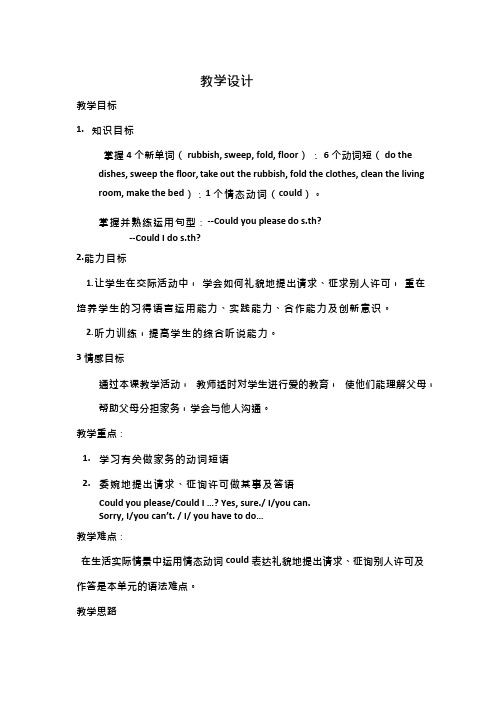
教学设计教学目标1.知识目标掌握4 个新单词(rubbish, sweep, fold, floor);6 个动词短(do thedishes, sweep the floor, take out the rubbish, fold the clothes, clean the living room, make the bed);1 个情态动词(c ould)。
掌握并熟练运用句型:--Could you please do s.th?--Could I do s.th?2.能力目标1.让学生在交际活动中,学会如何礼貌地提出请求、征求别人许可,重在培养学生的习得语言运用能力、实践能力、合作能力及创新意识。
2.听力训练,提高学生的综合听说能力。
3 情感目标通过本课教学活动,教师适时对学生进行爱的教育,使他们能理解父母,帮助父母分担家务,学会与他人沟通。
教学重点:1.学习有关做家务的动词短语2.委婉地提出请求、征询许可做某事及答语Could you please/Could I …? Yes, sure./ I/you can.Sorry, I/you can’t. / I/ you have to do…教学难点:在生活实际情景中运用情态动词could 表达礼貌地提出请求、征询别人许可及作答是本单元的语法难点。
教学思路本课是Unit3 第一课时,主要涉及用could 礼貌地请求及征求许可和问答。
教学中创设真实情景激发学生学习兴趣,培养学生分担家务的习惯。
首先以听说为主,掌握课时单词,运用句型Could you please…? Could I…? 课上引导学生积极参与课堂活动,老师少讲,鼓励学生多练。
教学方法:本节采用情景导入,利用真实语境学习could 表示请求与许可的用法。
本课采用多种教学手段及形式,展开课堂交际活动,在活动中学习、掌握知识。
教学过程:Step1.Lead in利用女儿在家做家务的真实情景导入新课。
八年级英语Unit3 Could you please clean your room课文讲解

八年级英语Unit3 Could you please clean your room课文讲解Unit 3: Could You Please Clean Your Room?n A:1."Peter。
could you please take out the trash?" This is apolite request asking Peter to take out the garbage。
"Could you please do something?" is a polite way to ask for ___ or assistance。
"Could" is a more polite way to ask than "can." The response tothis request can be "Sure," "Of course," "Certainly," or "No problem." If the person cannot do it。
they can say "Sorry。
Ican't." "Take out" means to remove something from a place。
When using a pronoun as the object。
it should be placed in the middle of the phrase。
For example。
"You can take it out."2."Can you do the dishes?" This is asking if the person can wash the dishes。
八年级英语下册 Unit 3 Could you please clean your

Unit 3 Could you please clean your room(Seciton B 3a-self check)学习目标:1、我要学会运用本单元的目标语提出客气的请求或征求许可。
2、我能综合掌握情态动词could的用法。
3、我能更好地解决生活中或学习中出现的问题和麻烦。
当堂测评分层达标基础落实★一、翻译下列词组:1. 倒垃圾____________________2. 叠衣服____________________3. 扫地板______________4. 整理床铺______________5. 出去吃饭_______________________6. 搭便车_____________________7. 生某人的气______________ 8. 放学回家__________________ 9. 过来\顺便拜访__________________________10. 扔下____________________ 11. 一直____________________ 12. 吃惊地____________________13. 做家务____________________ 14. 向某人借某物___________ 15. 把某物借给某人_____________________16. 邀请某人参加聚会___________________ 17. 为了_____________________ 18. 依靠_______________发展能力★★二、根据提示完成下列句子1. I’m going to _______ (work out / work on) my computer.2. My mother likes to _____ (make / do) breakfast.3. His grandfather is a great ____ (cook /cooker).4. I like cleaning the bike because it’s __________ (boring / interesting).5. I invited him ______________ (play) the game.6. It took me an hour ______________ (write) the letter.7. I spend two hours __________ (do) my homework.8. We _____________ (make) the bed just half an hour ago.9. 我不明白他为什么离开。
八年级英语下册-Unit-3-Could-you-please-clean-your-room-Se
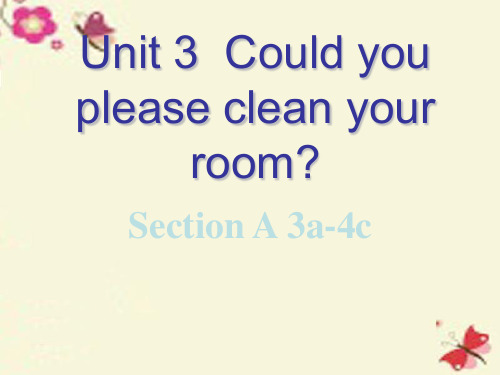
3b
Read the sentences below. Underline the sentences from the reading that mean the same thing.
1. Neither of us did any housework for a week. For one week, she did not do any housework and neither did I. 2. My mom came over as soon as I sat down in front of the TV. The minute I sat down in front of the TV, my mom came over. 3. You're tired, but I'm tired, too. Well, I work all day at school, too! I'm just as tired as you are!
not to get it wet.
1—d 2—a 3—c 4—e 5—b
4b Fill in the blanks in the conversation.
A: I hate to __d__o__ chores.
B: Well, I hate some chores too, but I like other chores.
2. Could I watch one show first? (noun) ___C_o_u_l_d_y_o_u__p_l_ea_s_e__sh_o_w__m__e_y_o_u__r_n_e_w__b_o_o_k_?__(v_e_r_b_)___ 3. I can't work all day. (verb) __I_t_’s__d_if_f_ic_u_l_t_t_o_f_in__d_w__o_rk__i_n_t_h_i_s_c_it_y_._(_n_o_u_n_)________ 4. You watch TV all the time. (verb) __H__o_w__m__u_c_h_i_s_t_h_a_t_w_a_t_c_h_?__(n_o_u__n_) _________________ 5. “What happened?” she asked in surprise. (noun) __I_t_w__o_n_'t__su__rp__ri_s_e_m__e_i_f_h_e_l_o_s_e_s_t_h_e_e_x_a_m__. _(v_e_r_b_)_____
人教版英语八年级下册 Unit3 Could you please clean your room教
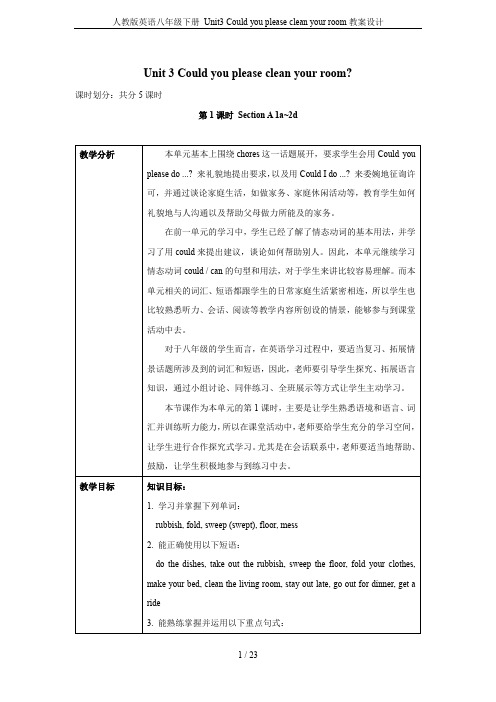
A: Could you please sweep the floor?
B: Yes, sure. Can you do the dishes?
A: Well, could you please do them? I’m going to clean the living room.
Peter
do the dishes
M
sweep the floor
M
take out the trash
P
make the bed
P
fold the clothes
P
clean the
living room
M
2. Make conversations about the chores in 1a.
7) Could you take out the rubbish, fold the clothes and do the dishes?
8) Could I at least finish watching this show?
能力目标:
通过听说训练,学会能够礼貌地提出要求或征询许可,并礼貌地回复别人的请求与征求。
Peter wantsto...
Peter’s fathersays
go out fordinner
√yes _____no
go to themovies
√yes _____no
stay outlate
_____ yes√no
get aride
_____ yes√no
Check answers.
Unit 3 Could you please clean your room?(解析版)
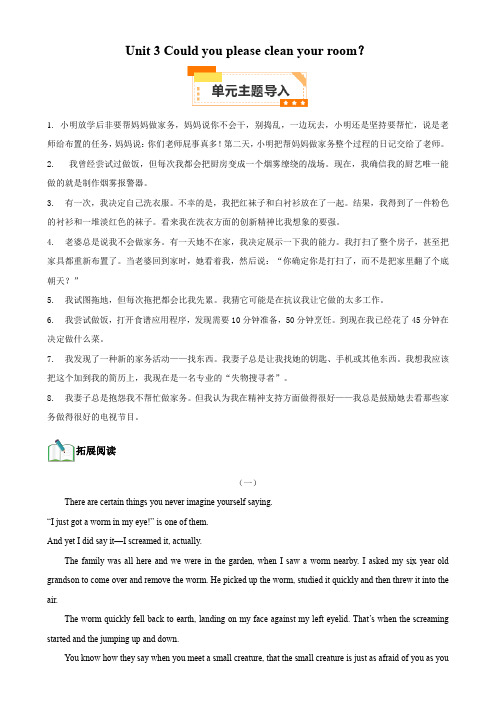
Unit 3 Could you please clean your room?1.小明放学后非要帮妈妈做家务,妈妈说你不会干,别捣乱,一边玩去,小明还是坚持要帮忙,说是老师给布置的任务,妈妈说:你们老师屁事真多!第二天,小明把帮妈妈做家务整个过程的日记交给了老师。
2.我曾经尝试过做饭,但每次我都会把厨房变成一个烟雾缭绕的战场。
现在,我确信我的厨艺唯一能做的就是制作烟雾报警器。
3. 有一次,我决定自己洗衣服。
不幸的是,我把红袜子和白衬衫放在了一起。
结果,我得到了一件粉色的衬衫和一堆淡红色的袜子。
看来我在洗衣方面的创新精神比我想象的要强。
4. 老婆总是说我不会做家务。
有一天她不在家,我决定展示一下我的能力。
我打扫了整个房子,甚至把家具都重新布置了。
当老婆回到家时,她看着我,然后说:“你确定你是打扫了,而不是把家里翻了个底朝天?”5. 我试图拖地,但每次拖把都会比我先累。
我猜它可能是在抗议我让它做的太多工作。
6. 我尝试做饭,打开食谱应用程序,发现需要10分钟准备,50分钟烹饪。
到现在我已经花了45分钟在决定做什么菜。
7. 我发现了一种新的家务活动——找东西。
我妻子总是让我找她的钥匙、手机或其他东西。
我想我应该把这个加到我的简历上,我现在是一名专业的“失物搜寻者”。
8. 我妻子总是抱怨我不帮忙做家务。
但我认为我在精神支持方面做得很好——我总是鼓励她去看那些家务做得很好的电视节目。
拓展阅读(一)There are certain things you never imagine yourself saying.“I just got a worm in my eye!” is one of them.And yet I did say it—I screamed it, actually.The family was all here and we were in the garden, when I saw a worm nearby. I asked my six-year-old grandson to come over and remove the worm. He picked up the worm, studied it quickly and then threw it into the air.The worm quickly fell back to earth, landing on my face against my left eyelid. That’s when the screaming started and the jumping up and down.You know how they say when you meet a small creature, that the small creature is just as afraid of you as youare of it? They lie.The worm showed no fear. I, however, am still having nightmares about the experience, which was several days ago.The most important thing in all this is that my grandson said he was sorry to me.I’d just been reading a book that makes a connection between adults doing the slow and hard work of teaching manners to children and greater levels of civility in society.Table manners, language manners and even manners in dress all show levels of self-control.Having self-control limits what we say and how we behave, making many of us appear a good deal better than we really are.Good manners also have the possibility to make mealtime a pleasant experience, even with small children.All of my grandchildren, except the ones that can’t yet talk, ask to be excused before leaving the table.It is a sign of respect for others at the table and a sign of respect for the meal itself. It’s also more pleasant than pushing one’s chair back and running for the back yard.Those tall enough, and even those not tall enough, also take their dishes to the kitchen.Manners are what civilize us—around our tables, in our families, homes and our communities.So when a little boy has the courage to apologize to a grandma who is screaming and jumping up and down, at least we know that our years of teaching young people manners are paying off—one worm at a time. 1.Where were they when the author saw a worm?A.In the house.B.In the garden.C.In the park.D.In the back yard.2.The worm fell down on the author’s________.A.leg B.head C.left eyelid D.right eyelid3.What does the underlined word “nightmares” mean?A.好运B.噩梦C.回忆D.愿望4.The author believed that his grandson’s apology is________.A.a good manner B.a bad behavior C.unnecessary D.a must5.What does the passage tell us?A.The importance of apology.B.The importance of good manners.C.Many kinds of good manners.D.A story of a worm.【答案】1.B 2.C 3.B 4.A 5.B【导语】本文主要以作者与其孙子的故事来讲述礼仪的重要性。
Unit3Couldyoupleasecleanyourroom教案上课讲义

Unit 3 Could you please clean your room?教学目标:1语言目标:谈论做家务的词汇,及如何有礼貌的提出要求。
2 技能目标:能听懂和谈论做家务的话题;能写出重点单词和重点句型。
3 情感目标:培养学生爱劳动,分享家务的能力。
教学重点短语: do the dishes, make the bed, take out the rubbish, fold the clothes, sweep the floor, clean the living room ……句子:1. Could you please take out the rubbish?t. I have to finish homework first.. Sure. / Sorry, I can’2. Could I use your computer?Sorry. I'm going to work on it now.3. Well, could I watch TV?Yes, you can. But first you have to clean your room.教学难点:Make polite requestsAsk for permission课时划分:Period 1 Section A 1a – 2dPeriod 2 Section A 3a-3cPeriod 3 Section A Grammar focus-4cPeriod 4 Section B 1a-2ePeriod 5 Section B 3a-self checkSection A1 (1a – 2d)Step 1 Warming-upSing the song and dance to the musicStep 2 Presentationand learn1. Watch the photos and talk about them “What does he do every day?’these phrases: do chores, do the dishes, make the bed, take out the rubbish,fold the clothes, do the laundry, clean the living room.2. Look these phrases and practice the conversation: Could you please take outt. I have to finish homework first.the rubbish? Sure. / Sorry, I can’3. 1a Do you do these chores at home? Discuss them with your partner.Step 3 Listeningmother or Peter.1b Listen. Who will do these chores? Check (√) Peter’sChores Peter’s mother Peterdo the dishessweep the floortake out the rubbishmake the bedfold the clothesclean the living roomStep 4 Practice1c Make conversations about the chores in 1a.Make conversations.ExamplesA: Could you please...?B: Yes, sure. /All right. /No problem./Certainly.Sorry, I can't. I have to do...Sorry, I can't. I am doing...Step 5 Listening 2a&2bPeter asks his father if he can do four things. What does his father say? Check (√). Draw lines to the reasons.“yes” or “no”. Listen againHis father’s reasonsPeter wants to…Peter’s father says…go out for dinner. Yes No I have to do some work.go to the movies. Yes No You have to clean your roomstay out late. Yes No I need to eat breakfast.get a ride. Yes No You have a basketball game.Step 6 Practice2c Make conversations using the information in 2a and 2bA: Could I use your computer?B: Sorry. I’m going to work on it now.A: Well, could I watch TV?B: Yes, you can. But first you have to clean your room?2d Role –play the conversationStep 7 Language points and summary1. help out 动词短语,表示在某人繁忙或遇到困难时“给予帮助”。
Unit 3 Could you please clean your room_知识点讲义

人教版八年级下册Unit3讲义重点句法词法:一、Could 的用法Could表示有礼貌地提出请求,征求许可,其用法如下:1.Could 表示有礼貌地提出请求。
Could you (please) do...?表示“请你做...好吗?”could you (please) do...?的否定结构是在please 后加not。
Could you (please) open the window ?2.Could表示征求许可,希望得到允许。
句型Could I do...?表示“我可以做...吗?”Could I go to the movies?3.回答时应注意几个问题:(1)对这样的句式作答时,与其它的一般疑问句不同,作肯定回答通常用certainly, sure, of course等。
作否定回答时,通常以sorry开头。
(2)回答could引导的问句时要用can或can’t,不能用could。
二、情态动词表示说话人语气的单词。
不能单独做谓语,只能和动词原形1、情态动词没有人称和数的变化,情态动词后面跟的动词须用原形,否定式构成是在情态动词后面加"not"。
例: She can sing an English song.We should do our homework right now.I can’t speak English very well.三、情态动词的用法(1)Can的用法①表示体力或脑力方面的“能力”Can you speak English?你会说英语吗?②表示客观条件允许You can’t park your car here.你不能在此停车③can用在否定句和疑问句中时,有时表示说话人的怀疑,惊异、猜测或不肯定:He can’t be in the library。
他现在不会在图书馆。
四、borrow、lend、keepborrow和lend都有“借”的意思,但它们的含义和用法有所不同。
Unit3-Could-you-please-clean-your-room课文讲解-

Unit3 Could you please clean your room?Section A1.Peter ,could you please take out the trash? 彼得,你能把垃圾倒了吗?【解析1】Could you please do sth ?请你(做)......好吗?用于提出请求,希望得到对方的肯定回答,说话的语气比较客气委婉。
Could 不是can的过去式,是委婉、礼貌的说法。
回答用can.【常用答语】肯定回答:Sure./ Of course./ Certainly./No problem.否定回答:Sorry , I can’t 【解析2】take out 取出(v+ adv)【注】: 跟代词做宾语,代词放中间;跟名词做宾语,可放在中间,也可放在后边【短语】take out the trash 倒垃圾take a walk 散步take away 拿走,取走take back 收回take place 发生take off 脱下;起飞The gift is in the box. You can take it out.2. Can you do the dishes.?那你可以洗盘子吗?do the dishes 洗碗【结构1】do the +名词:do the dishes/ laundry 洗餐具/衣服【结构2】do the +动词-ing do the cleaning 打扫卫生【结构3】do one’s + 名词do one’s housework/ homework 做家务/家庭作业【结构4】do some +动词-ing do some reading/ shopping 读写书/购物3.Could I at least finish watching this show? 至少让我看完这个节目可以吗?【解析1】Could I do a sth? 我可以做......吗?用于表达请求,语气比较委婉。
- 1、下载文档前请自行甄别文档内容的完整性,平台不提供额外的编辑、内容补充、找答案等附加服务。
- 2、"仅部分预览"的文档,不可在线预览部分如存在完整性等问题,可反馈申请退款(可完整预览的文档不适用该条件!)。
- 3、如文档侵犯您的权益,请联系客服反馈,我们会尽快为您处理(人工客服工作时间:9:00-18:30)。
目标
Listen to conversations of polite request and permission.
Make polite request and ask for permission.
Read an e-mail message about making requests.
Write an e-mail message to ask for help.
No, you can’t. I have to go out.
教学重难
点
解决措施
Could for polite request
Could for permission
其主目标是能用“Could you please do things?”“Could I please do things?”谈论如何委婉地提出请求或征求别人的许可,及回答语“Sure / Certainly / I’m glad to .”能礼貌地拒绝,“Sorry, I / you can’t,. I / you have to do…”并表达自己的理由,陈述自己的好恶。以do housework和调查做力能所及的事为话题,学会运用“Could you please do things?”“Could I please do things?”是本课的语言目标
Section B 1a列出了一些动词短语,让学生判断哪些活动是孩子为家长做的,哪些是家长为孩子做的,为后面的活动做了语言材料的准备;1b是在1a基础上的口头训练,强化学生对目标语言的运用;2a和2b是两个听力练习,主题是party的准备,要求学生听录音列出每个人所要做的事情;2c是会话练习,是上面听力活动的延伸,帮助学生在听力输入的基础上进行语言输出练习;3a为一篇阅读材料,要求学生对文章中出现的一些家务活动进行分类;3b和3c是写作训练,学生模仿3a的阅读文章用目标语言写电子邮件,向他人提出请求,寻求帮助;
பைடு நூலகம்第3单元单元教材研究教法建议
课题
Unit 3 Could you please clean your room?
单元课时
6
教学
内容
分析
1.教材分析
本单元的话题是Chores,要求学生学会用Could you please ...?和Could I please ...?来委婉地提出请求或征求别人的许可以及如何有礼貌地拒绝别人并表达自己的理由,陈述自己的好恶。通过单元学习,学生还将了解中西方在这方面的文化差异,增强他们在日常生活中的沟通和交流能力。
Section A以图片及对话Peter, could you please take out the trash? Sure, Mom.引入本单元的话题。1a是一个结对子活动,通过讨论在家做哪些家务活来引入本单元的重点词汇;1b让学生听一段对话录音,根据听到的内容选择Mom和Peter各做的家务活,帮助学生从听力材料中了解、获取如何使用目标语言;1c是一个口头会话练习,指导学生如何结合图片用目标语言Could you please ...?进行对话;2a和2b是两个听力活动,通过听力训练帮助学生进一步了解目标语言的用法,学习如何使用Could I ...?和Could you ...?提出请求、征求许可;2c是在以上听力活动的基础上的口头练习,学生分角色扮演父亲和儿子,练习用目标语言委婉的提出请求;3a是用make或do补全一篇对话,掌握一些和家务有关的动词短语的用法;3b要求学生列出自己平常所做的家务活并说明喜欢或不喜欢,并向同伴说明理由;4是一个小组活动,学生把一些家务活写到卡片上并正面朝下,然后拿出其中一张要求同伴去做这项家务活,同伴拒绝并说出原因,从而在游戏活动中巩固所学知识。
Make polite requests
Could you please clean your room?
Could you please do the dishes?
Ask for permission
Could I please go to the movies?
Yes, you can.
Could I please use the car?
. Sure. / Sorry, I can’t. I have to finish homework first.
2.Could I use your computer?
Sorry. I'm going to work on it now.
3. Well, could I watch TV?
Yes, you can. But first you have to clean your room
Make versus do
本单元知识结构
短语: do the dishes, make the bed, take out the rubbish, fold the clothes, sweep the floor, clean the living room ……
句子:
1.Could you please take out the rubbish?
